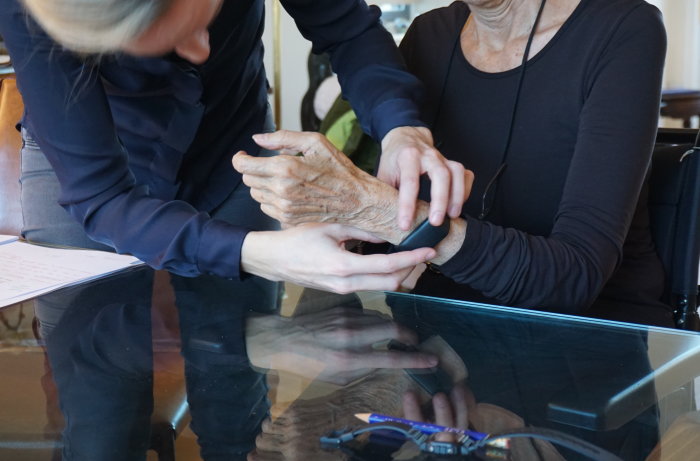Trial of stroke rehabilitation app launches

A trial of a digital app designed to support stroke survivors through their rehabilitation has begun recruiting its first patients.
Called OnTrack Rehab, the platform uses applications for both smartphones and smartwatches, and aims to facilitate arm rehabilitation through daily monitoring and tailored coaching, both online and face-to-face.
Led by the Helix Centre, part of the College’s Institute of Global Health Innovation, the study builds on an early prototype that showed encouraging early results with 10 patients. Now, researchers will evaluate the intervention with a larger cohort of stroke survivors and begin to identify who might benefit most.
“Stroke is the number one cause of disability in the UK and the journey towards recovery is often long and arduous, with many reporting that they don’t feel supported once they leave hospital,” said Gianpaolo Fusari, Senior Designer at Helix and OnTrack project lead.
“With OnTrack, we want to empower and motivate stroke survivors in their own recovery, to not only enable a more effective rehabilitation process and greater independence, but also alleviate the burden on carers and stretched health systems.”
The long road to recovery
People who have survived a stroke commonly experience difficulty using their arms, affecting as many as 80% of patients. This can cause them to lose their independence, which not only impacts their lives and those of their families, but also health systems that dedicate resources to providing care and rehabilitation in the home.
Repetitive exercises can help stroke survivors regain the use of their arm. But achieving results can demand hundreds of hours of activity, and national guidelines of recommended daily amounts of exercise are often not met. Many patients feel isolated upon leaving hospital to return home, and lose the motivation to carry out the intense programme of activity required.

OnTrack was developed in response to these issues. Exploiting technology embedded within smart devices, the application uses a machine-learning algorithm tailored to pick up stroke survivors’ movements to gather minutes of arm activity – similar to how a step counter works – and provides real-time feedback alongside personalised advice and education. Coupled with face-to-face sessions at regular intervals, the digital platform is designed to motivate the individual to engage with their rehabilitation and to show both the user and the therapist their progress in a tangible way.
“One of the benefits of OnTrack is that it offers a window into people’s activity in between therapy sessions – at the moment insight into this crucial time relies on self-reporting, so we don’t really know whether people are keeping up with their exercises,” said Ella Gibbs, a physiotherapist and Helix Clinical Researcher on OnTrack.
“But with OnTrack we can measure progress and tailor their treatments accordingly, which could ultimately mean patients achieve a better outcome.”
Measuring, learning, improving
Early results have shown an average activity increase of 20% in patients, translating to roughly an extra hour of arm activity per day. While promising, a more robust study and evaluation are required to demonstrate that such results are due specifically to OnTrack, which this new feasibility study will help towards.
Funded by the NIHR Imperial Biomedical Research Centre, the study will use machine learning on the data gathered to make further improvements to the algorithm, while also assessing OnTrack’s effectiveness at improving arm function.
While the app is currently designed for Apple technology, the researchers have plans to extend the platform to other devices, and future work will also investigate whether OnTrack could have applications beyond stroke, such as for people with Parkinson’s disease or those recovering from surgery.
“After years of research and development, working in close collaboration with hundreds of stroke survivors, carers and therapists, we’re incredibly excited to begin to show the potential of OnTrack to aid effective rehabilitation and complement the efforts of professionals and informal carers,” said Daniel Dickens, Managing Director of the Helix Centre.
“We hope that in the future, OnTrack can become an integral part of NHS and other stroke services, helping more people along the path to recovery.”
Article supporters
Article text (excluding photos or graphics) © Imperial College London.
Photos and graphics subject to third party copyright used with permission or © Imperial College London.
Reporter
Justine Alford
Institute of Global Health Innovation